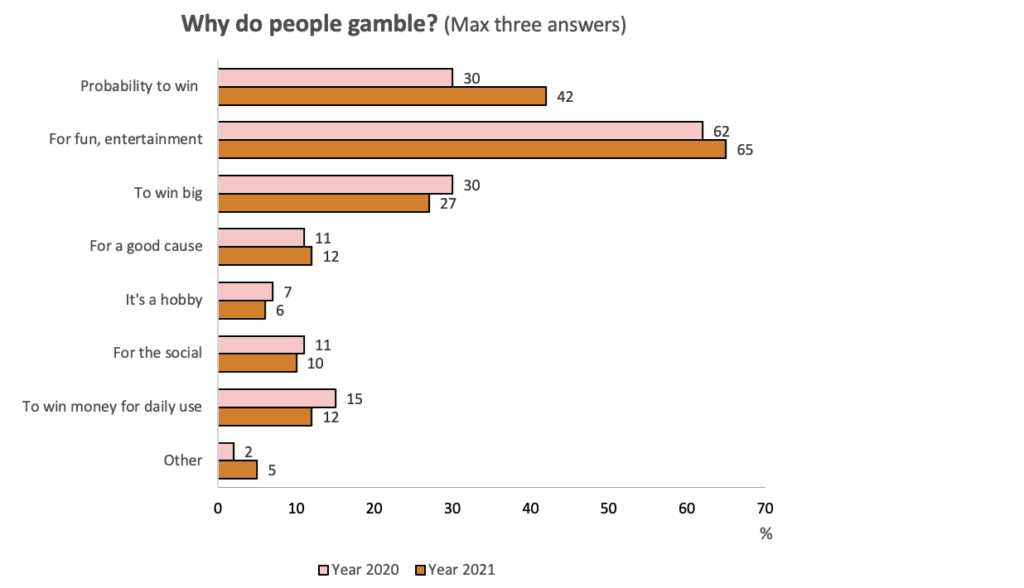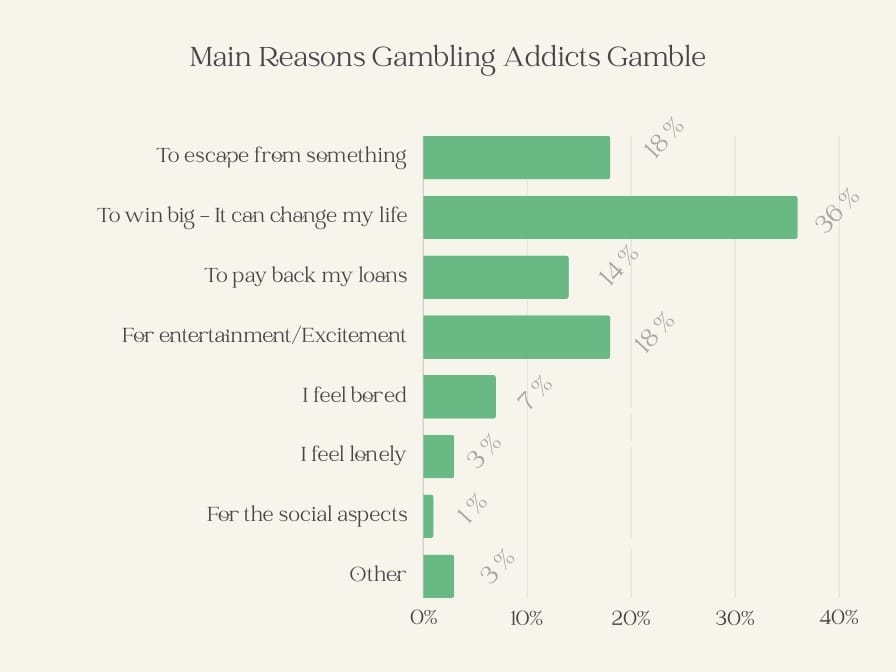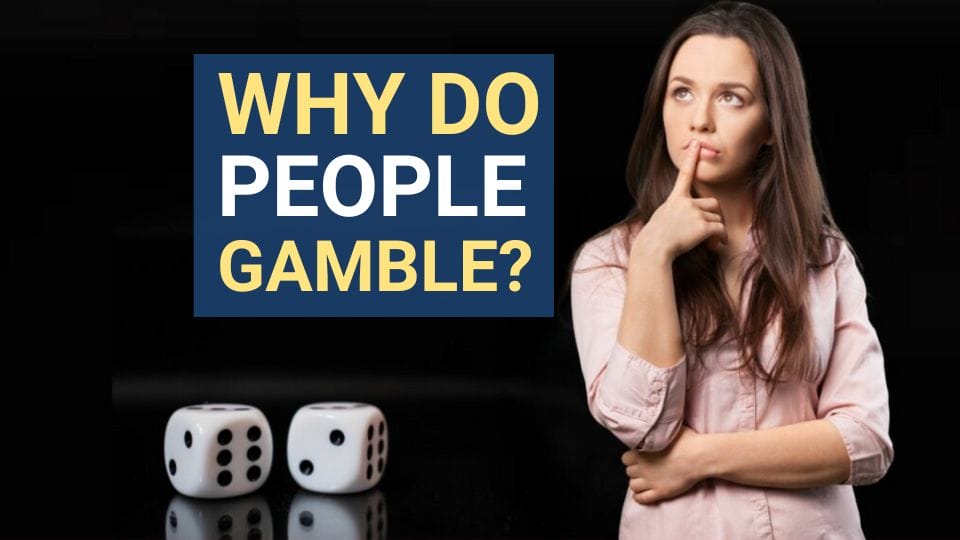The question, ” Why do you gamble? ” can teach us a lot. People gamble for many reasons, but it often starts with the thrill of winning money. Knowing that one spin can change one’s life forever is exciting.
Do you have a gambler in the family and no idea what to do? Would you like some help? We have created a video course to help you:
- Understand why the person gambles.
- Get the situation under control.
- Protect your finances and mental health.
- Create the hope, motivation, and courage you need to act.
- Give you tips and tools so you know how to help the gambler.
The diagram below summarizes why people gamble in Sweden. The Swedish study is made on people who engage in gambling in general. Entertainment and the chance to win, or win big are by far the most common reasons why people gamble. If you’re curious, you’ll find the full study of why 1600 Swedes gamble here.

Why do people gamble – How it starts
Gambling starts as a fun and exciting activity, and some people gamble to socialize[1] with friends. If you ask a gambler why she gambles, these are common answers you’ll get. They might be true initially, but for a problem gambler or a compulsive gambler, it’s rarely about the money or excitement anymore.
In a study on QuitGamble.com, we asked 3300 gambling addicts why they gamble. Here are the reasons.

As you can see, there are big changes in why do people gamble between causal gamblers and problem gamblers. Among problem gamblers, the main reason they gamble is to win big – it can change my life. Paying back loans is also related to winning money.
We have talked with hundreds of problem gamblers over the years, and it’s true that they believe they gamble to win big. But gambling to win is rarely the real reason. (In fact, we have never talked to any gambling addict who actually gambles to win.)
How is that possible?
We ask the following questions: What happens when you win? Do you stop and celebrate, or do you continue to gamble until you’ve lost everything? So far, everyone says they continue gambling. So, it doesn’t matter if they win or lose; they will continue to gamble until they’ve lost everything. A reasonable conclusion is that for gambling addicts, gambling isn’t about winning at all. It’s about something else.
To give more insights into why do people gamble. History is full of jackpot winners who relentlessly continued to gamble until they had spent every penny. So, what could the real reason be?
In our study on QuitGamble.com, 18% said they gamble to escape something, 7% for feeling bored, and 3% for loneliness. Other reasons can be stress, anxiety, or poor self-confidence. Gambling has become a way to deal with challenging situations in life.
In How to help a gambling addict, we have changed the question Why do people gamble to What happens when you gamble? Even if we want to understand why people gamble, asking about what happens is more neutral. Gamblers get the question of why they do what they do all the time, and the chance they give a defensive, rather than a truthful, answer is high. Nobody likes to be criticized. Test the following questions:
- What happens when you gamble?
- Does it create a moment of peace?
- A period when nothing else matters?
- Perhaps the answers can explain why it’s so hard to quit gambling.
These questions are neutral. They don’t put any value of right or wrong into the answer. It increases the chances that you get a truthful answer.
If you’re a gambler, these questions might be helpful. They will help you understand why you gamble; what gambling is doing for you. Because gambling is doing something for you, that’s the reason it’s so hard to stop gambling.
Why are some people more sensitive to gambling?
A lot of research has been done on the addiction gene, but so far, it can’t be proven that there is an addiction gene. However, in his book In the Realm of Hungry Ghosts: Close Encounters with Addiction, Dr. Gabor Mate discusses how addiction can be transferred from parent to kid through multiple generations. Dr. Gabor Mate wrote about his first years growing up in Budapest and how the stress of his mother created anxiety in him as an infant.
The addiction gene might exist, or it might not. 80% of the Swedish population gamble every year, but only 2-3% have gambling problems (Swedish health authority). Other countries show similar gambling addiction statistics. That indicates that some people are more sensitive to gambling. We believe that gambling affects us differently because we all experience various levels of pain in life. For a person who suffers from anxiety, depression, stress, boredom, loneliness, or feels that life is meaningless, gambling will most likely have a more substantial effect than a person who experiences less pain.
What does that mean? It means that if a person goes through a painful separation, loses their job, grieves, or experiences other pain. They are more sensitive to developing a gambling problem through escape gambling. If you’re a family member or friend, pay extra attention to how the person gambles during times like that. If you need some support, we can recommend the guide on how to help a gambling addict.
Why people gamble – Escalation of a gambling problem
As a gambler, we recommend you look at the Gambling Addiction Curve. It’s a tool that visualizes the connection between why you play and the consequences. It’s advantageous if you’re in it for the money.
As a relative or friend, it’s good to keep an eye on the person who gambles. Look for changes in their behavior. Here are a few common signs of gambling problems, according to (Pietro Ferrara)[2]:
- Developing mood swings or getting easily upset
- Problems sleeping
- A person isolates himself from friends and family.
- They spend a lot of time gambling or hiding what they are doing.
- Problems completing things on time. Stuff at work or being late for appointments.
- Ask about money and receive reminders of invoices.
If you want to know more about the signs of gambling addiction, we recommend the article: 53 Symptoms of Gambling Addiction.
A particular sign that few talk about is if the gambler changes how he talks about gambling: perhaps he spoke a lot about gambling in the past, but suddenly he stopped talking about it. (But he still gambles)
If you’re a gambler, one thing to look out for is if you think about gambling/betting even when you’re not gambling.
When you read stories about gambling problems, you can often see a pattern. Not everyone comes from a broken home, has been abused, or had addicted parents. Usually, the person had a good life before something happened. They might have gambled for years without showing any signs of a problem. But then something happens – an accident, long sick leave, a divorce, or the kids moving out, which creates a lot of pain. Suddenly, gambling becomes a way to escape the pain, and rapidly, a gambling problem develops. Be extra attentive to the gambler in painful situations as a relative or friend.
Take action: What you can do today
As a relative or friend:
Here are a few things you can do to help a gambling addict.
- Focus on yourself. Don’t sacrifice yourself to help the person. Otherwise, you might become codependent.
- Join our QG Community or find a support group near you. We’re here to support you.
- Take our Nonviolent communication course. It’ll aid you in communicating with the person with gambling problems. Reach out to the person to understand why people gamble by asking him/her: What happens when you gamble? Does it create a moment of peace? A period when nothing else matters? Perhaps the answers can explain why it’s so hard to quit.
- Help him/her to seek help. You’re both welcome to join our community. Alternatively, find something that suits your needs.
As a gambler
Suppose you want to stop gambling. There are some things you can do to improve your chances of success. The most common strategy is to run away from the problem. People try to stop cold turkey. For some, it works, but most people fail. Here is an analogy:
Think of you trying to run away, but the addiction has a GPS tracker on you. You can run, but as soon as you stop, the addiction is creeping up on you again. The only way to succeed is to run long enough so the battery in the tracker runs out. Some people succeed. Most don’t.
Instead of running, let’s face the problem head-on. Let’s challenge addiction and look for its cause. One helpful tool is the Happiness Test. It doesn’t tell you if you have a gambling problem. Instead, it helps you identify areas that cause you pain. In other words, what makes it so hard to stop gambling?
Here are a few more things you can do:
- Ask yourself: What happens when you gamble? Does it create a moment of peace? A period when nothing else matters? Perhaps the answers can explain why it’s so hard to quit.
- Find support in our online community or join a support group nearby.
- Work actively to become proactive rather than only react when you feel an urge to gamble. Creating your change plan is a good start.
- Take a small step each day to become a happier person. Target the areas that cause you pain today, and you’ll see how the urge to gamble gradually disappears.
Conclusion
Gambling can be a fun activity, but understanding why do people gamble is important since that determines the risk of developing a gambling problem if you’re trying to help someone with a gambling addiction. Instead of asking why people gamble, ask natural questions about what happens when they gamble. By asking natural questions, it’s more likely you get an honest answer. The same goes if you’re a gambler.
Sources:
[i] (Kim 2017) Why do young adults gamble online? (2017) Hyoun S. Kim, Michael J. A. Wohl Psychopharmacology
[ii] (Ferrara 2018) Gambling disorder in adolescents: what do we know about this social problem and its consequences? Pietro Ferrara, Giulia Franceschini & Giovanni Corsello
[iii] (Anselme 2013) What motivates gambling behavior? Insight into dopamine’s role – Patrick Anselme & Mike J. F. Robinson
